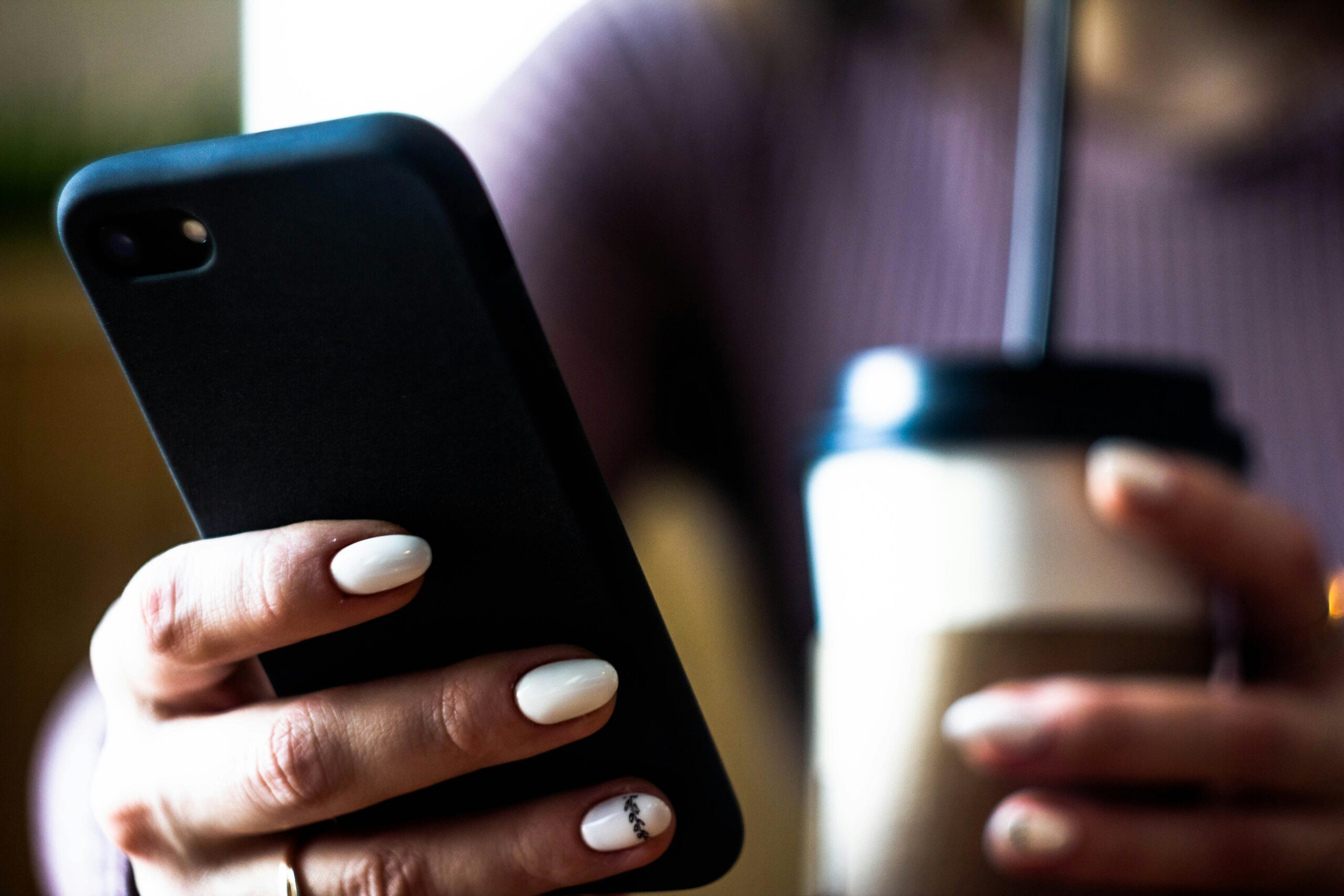Most of us have probably found ourselves late-night scrolling on social media, sometimes as a subconscious way to zone out the problems of the day or avoid worries brewing under the surface.
We use it to turn our brains “off,” or to escape for a moment in-between responsibilities. Goodness, I have even done it while trying to wade through the massive amount of information that arose in writing this article.
Just a little brain break, right? It can turn so quickly into precious minutes lost.
There are positive aspects to social media, of course. I mean, who doesn’t love to crowd-source ideas for the best pumpkin bread recipes and find hacks for getting stains off the carpet?
Then, there is that warm sense of understanding we may find. In early postpartum I felt connected to other moms in the late-night hours, reading about bedtime routines, sleep deprivation, and ways to build attachment with my daughter. I didn’t feel so alone in those moments.
But what is the net value of social media usage? I think about this question all the time.
I often consider the impact of “constant scrolling” on the teenage brain: specifically, what it must be like for teenagers who are bombarded with mental health content algorithms, late at night in their rooms, hurting and alone, watching video after video of information that may or may not be fully true or applicable.
Stories of suicides and eating disorders, stays in inpatient psychiatrist hospitals, and personality disorders start coming with fervor and simply do not slow down. It is easy for someone, especially a teen, to feel connected to pieces of another person’s story and suddenly pathologize their own experiences, whether the diagnosis is accurate or not.
Mental health experts are beginning to recognize trends of over-identifying, self-diagnosing, and even copy-catting of mental health symptoms from teens and adults alike due to a new influx of what some have deemed “TikTok psychology,” or learning about one’s mental health on social media [1, 2, 8].
Without individualized care from a professional, young people’s searches for mental health support can quickly turn into more intensified problems.
As a culture that has information at our fingertips, we must daily strengthen the muscle of discernment as we engage with social media platforms.
But for adolescents, that discernment muscle is still a wee little thing (as it should be at this stage; the prefrontal cortex does not fully develop until age 25 in some cases). Adolescents are still building essential brain pathways meant to help with decision making and impulse control.
Adults should be committed to modeling and openly discussing the importance of healthy relationships with social media, particularly social media that targets mental health content.
For the purpose of this article, I created a Tik Tok account today and set my age as 13. I then searched for mental health content, and began to scroll. Friends, it was heavy. These are topics that
require back-and-forth conversations, in a setting where a child can ask questions from a trusted adult in a safe space.
One video, posted by an actual (allegedly) licensed professional counselor urged individuals who struggle with fidgeting to consider if they may have clinical anxiety or clinical depression.
Imagine if I was actually a 13-year-old girl (who happens to fidget) who was watching this? Now what do I wonder about myself after watching this video? And what do I search for next? Yep, symptoms of depression and anxiety. And the snowball rolls, and I begin to create self-fulfilling prophecies about these diagnoses I may have.
While an adult or even an older teenager may recognize that fidgeting is not a singular qualifier of a mental health diagnosis, a 13-year-old may not be so savvy to think this through.
You know what COULD be the issue for my hypothetical 13-year-old self? Maybe I really have ADHD. Or maybe I have no diagnosis at all, but a series of videos meant for someone with a stronger discernment muscle have convinced me there is a real issue here.
And now these increasingly darker and more chilling videos about depression and mental health flood my feed. The chances of me asking questions about it to an adult in my life is pretty slim. After all, I am feeling connected to the stories of other people with issues I now align with.
_______________________________________________
I am aware of the divisive nature of this topic. And I’m not here to villainize a certain social media platform as “all bad” or all-out praise it, either. I am asking individuals of all ages to approach this topic with openness and thoughtfulness.
And though we focus specifically on Tik Tok for this discussion, there are rising concerns about a number of social media platforms that may contribute to the mental health discussions at hand.
The Depression and Bipolar Support Alliance shares that
the more time a person spends on social media, the more likely they will experience mental health symptoms such as anxiety, isolation, and hopelessness. And according to one recent study, high levels of social media use over the span of four years was associated with increased depression among middle and high school youths [17].
We also know that, during the coronavirus pandemic, TikTok users aged 15-25 grew by 180% [2].
Our young people are yearning for connection, probably even more so than the average adult; adolescence is marked by increased desire to seek relationships and build interpersonal skills. It is a part of growing into a balanced individual to practice having different kinds of relationships during this time of life.
But if those interpersonal skills are only being practiced from behind a screen, it could be that major developmental markers are being missed in an entire generation.
________________________________________________
Earlier this year, both the United States Surgeon General and the American Psychological Association (APA) released health advisories regarding social media use and its impact on the mental health of young people. [1, 5 15, 16].
The U.S. Surgeon General’s statement shared that “up to 95% of youth ages 13-17 report using a social media platform, with more than a third saying they use social media ‘almost constantly’” [15].
So whatever our feelings are about social media, we cannot deny that some ground rules for use would be helpful.
Thankfully, the APA offered just that: 10 recommendations for youth who engage on social media platforms. While these are helpful, it should be recognized that some of these recommendations are all but impossible to actually monitor from a parenting standpoint.
Content is constantly being created online, and algorithms ensure that the content someone searches and likes becomes the central focus of content that is continued to be given to them. Actual monitoring to ensure the type and amount of content that a teen or child is receiving is impossible to quantify.
Thus, I urge parents to recognize that these recommendations exist to educate parents and adults, not as an actual achievable set of guidelines.
What is achievable, however, is modeling healthy engagement practices with social media, and having ongoing conversations about tech hygiene .
_______________________________________
Many of you may know that In the spring of 2021, Tik Tok released its new “Wellness Hub,” meant to connect users to content particularly related to the areas of Food & Nutrition, Fitness, Life Advice, and Mindfulness [9]. I have faith that the intention was positive: to give individuals a place to source information and build a sense of community support on wellness topics.
But while many content creators and influencers are licensed professionals who are using the platform to share pertinent information, a host of them are not trained in these areas at all. And as we have discussed before, even professional opinions can be misunderstood as a way to wrongly self-diagnose, especially when younger viewers are engaging in “constant use” of social media.
This does not even account for the Tik Tok trends that have proven to be outright fatal or dangerous.
There are plenty ways to help your child built autonomy and independence, and respect their privacy without handing them a handheld computer and algorithm-based apps without setting some serious boundaries.
Does that feel like a major task to approach alone? Thankfully, new groups such as Osprey (Old School Parents Raising Engaged Youth), and even silicon valley professionals themselves are rallying to encourage parents to delay certain tech and social media usage for their children [11].
Your child may still feel like the “only ones” not engaging in social media spaces, but they are not. These families are banding together and providing spaces where families hesitant to let their children on social media can connect with each other and find comradery.
Children need us to set standards so that they can identify a baseline approach to operating in this world in a healthy way. Will we rise to the challenge or follow the path of least resistance? The answer to this question may determine the next generation’s ability to self-regulate and operate in basic community relationships. No pressure, right?
References:
1. American Psychological Association. (n.d.). Health Advisory on social media use in adolescence. American Psychological Association. https://www.apa.org/topics/social-media-internet/health-advisory-adolescent-social-media-use
2. Calling dr. Tiktok: Experts weigh in on an alarming social-media trend. Calling Dr. TikTok: Experts Weigh In on an Alarming Social-Media Trend | Giving. (2022). https://give.as.virginia.edu/news/story/calling-dr-tiktok-experts-weigh-alarming-social-media-trend
3. CCDH. (2022, December 15). New report: Deadly by design. Center for Countering Digital Hate | CCDH. https://counterhate.com/research/deadly-by-design/
4. Center for Countering Digital Hate | CCDH. (2022, December 15). https://counterhate.com/wp-content/uploads/2022/12/CCDH-Deadly-by-Design_120922.pdf
5. Hatmaker, T. (2023, May 10). American Psychology Group Issues Recommendations for Kids’ social media use. TechCrunch. https://techcrunch.com/2023/05/09/american-psychology-org-releases-guidelines-for-kids-social-media-use/
6. Hurst, A. (2022, May 23). Your brain on social media. ChristianWorks. https://christian-works.org/your-brain-on-social-media/
7. Is social media threatening teens’ mental health and well-being? Columbia University Irving Medical Center. (2021, May 20). https://www.cuimc.columbia.edu/news/social-media-threatening-teens-mental-health-and-well-being
8. Kelly, S. M. (2023, July 20). Teens are using social media to diagnose themselves with ADHD, autism and more. parents are alarmed | CNN business. CNN. https://www.cnn.com/2023/07/20/tech/tiktok-self-diagnosis-mental-health-wellness/index.html
9. Malik, A. (2023, May 15). Tiktok adds a new mental health awareness hub to provide users access to resources. TechCrunch. https://techcrunch.com/2023/05/15/tiktok-new-mental-health-awareness-hub-access-resources/
10. Mello-Klein, C. (2023, September 12). Is TikTok helping autistic people self-diagnose? new research shows role app plays in diagnosis. Northeastern Global News. https://news.northeastern.edu/2023/09/01/self-diagnosing-autism-tiktok/
11. Nathani, K. (2018, August 30). The techpreneurs of Silicon Valley are keeping their families away from technology. should you too?. Entrepreneur. https://www.entrepreneur.com/en-au/technology/the-techpreneurs-of-silicon-valley-are-keeping-their/319288
12. Orben, A., Tomova, L., & Blakemore, S.-J. (2020, August). The effects of social deprivation on adolescent development and Mental Health. The Lancet. Child & adolescent health. https://www.ncbi.nlm.nih.gov/pmc/articles/PMC7292584/
13. Rogers, K., LaMotte, S., & Marples, M. (2022, December 28). The Tiktok Wellness Trends we should and shouldn’t take into 2023, according to experts. CNN. https://www.cnn.com/2022/12/28/health/tiktok-trends-best-worst-2022-wellness/index.html
14. Siegel, M. (2023, March 27). How tiktok can harm your teen’s mental health. New York Post. https://nypost.com/2023/03/26/how-tiktok-can-harm-your-teens-mental-health/
15. Social Media and youth mental health – hhs.gov. (2023, May 23). https://www.hhs.gov/sites/default/files/sg-youth-mental-health-social-media-advisory.pdf
16. Surgeon general issues new advisory about effects social media use has on Youth Mental Health. HHS.gov. (2023, May 23). https://www.hhs.gov/about/news/2023/05/23/surgeon-general-issues-new-advisory-about-effects-social-media-use-has-youth-mental-health.html
17. Tiktok and Youth Mental Health: Weighing the pros and cons. Depression and Bipolar Support Alliance. (2022, July 25). https://www.dbsalliance.org/education/newsletters/tiktok-and-youth-mental-health/
18. Umay. (2022, September 15). What is “tech hygiene”? Umay. https://umay.rest/blogs/post/what-is-tech-hygiene





